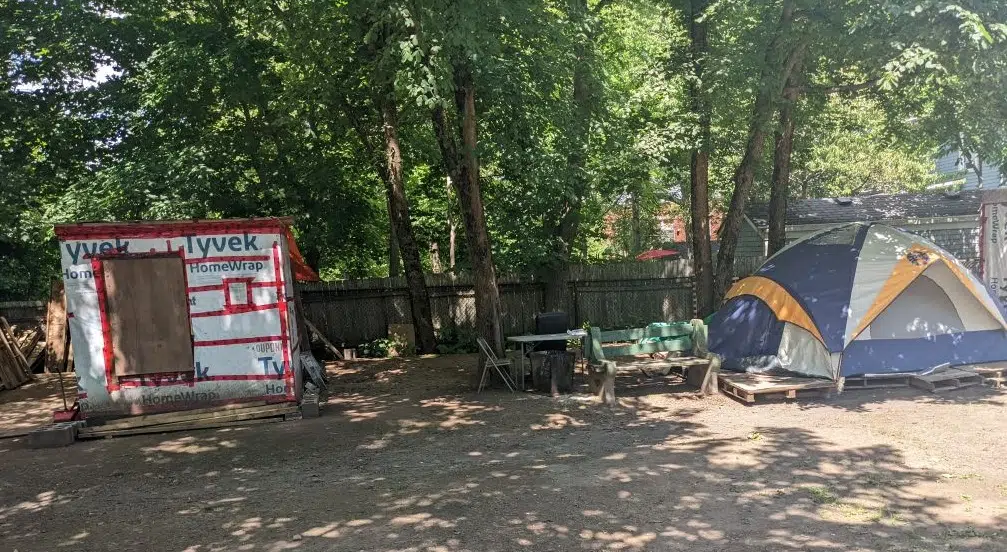
Halifax has a hidden homeless problem and experts say it’s making it harder for women to find safe spaces.
Crystal John with Adsum for Women and Children tells our newsroom they’re getting priced out of the housing market amid high prices and a short supply.
The social work coordinator at the Halifax emergency shelter says that means some will couch surf or stay in unsafe situations because they have nowhere else to go.
“We are seeing women and children that have never experienced homelessness in their lives. They’ve been able to manage their expenses, and affordability of apartments has never been a problem,” John says. “We’re seeing an increase in the number of mature women who are losing their homes to renoviction. They’ve been in these places for sometimes 20, sometimes 30 years.”
John says women have been greatly impacted by the pandemic with job losses and increased barriers to shelter access. According to a survey released by Stats Canada in May 2021, women saw greater employment loss than men at 54 per cent.
It doesn’t help that paychecks have been stretched thin with the average one-bedroom apartment in the city now going for $1,500, according to Rentals.ca. It’s $2,150 for a three-bedroom.
“We’re taking away women’s choices of safe and affordable housing,” John says.
Halifax vacancy rate at 1%
In Halifax, the vacancy rate is less than one per cent. The Canada Mortgage and Housing Corporation’s 2022 Rental Market Report shows that’s amongst the lowest in Canada.

Average rents in Halifax based on data from rentals.ca.
John says Adsum has seen an increase in demand for its services as more women look to find safe and affordable spaces to stay, especially as pandemic restrictions drop.
In one week, Adsum welcomed 19 women and about 40 children, with most of them fleeing intimate partner violence.
“Imagine they’ve been at home for the last two years, almost three years now. Living in an abusive home is really challenging in and of itself. But during COVID that was the only space they had,” John explains. “And so after COVID, we found a lot of women are looking for an escape, looking for an opportunity to restart. And our current housing stock just is not affordable. And so they’re finding themselves homeless.”
More people picking up the phone for help
The phones have also been ringing more at the shelter with service and bed requests.
In the last year, Adsum has seen the average number of monthly calls jump from roughly 100 to 300.
“Now we’re finding that even those who are working, cannot afford a basic one-bedroom apartment,” John says.
She adds some will couch surf or stay in unsafe situations while others will trade for sexual favours because living outside can be dangerous or they simply have nowhere else to go.
“There’s a lot of hidden homelessness, even in our abandoned buildings in the city, if you were to kind of take an overview of that, you would see a lot more homelessness,” John explains. “In the summer, we see a lot more people tenting, and not just in the parks, where they’re visible, but also in our woods.”

Meagher Park. (SOURCE: Calista Hill with Halifax Mutual Aid)
If you need help, sometimes it’s just about picking up the phone and making that call. Adsum is equipped to help women who have faced violence in the home.
It’s also putting the final touches on its new affordable housing called Sunflower House, which will create 25 units.
“Wherever there is homelessness with women, often there is intimate partner violence,” John says. “Although we don’t specialize in intimate partner violence, we deal with that on an ongoing basis every single day.”
John wants us to remember just because the province is in a housing boom, doesn’t mean it’s safe and affordable. She warns those looking for a fresh start that what they might find instead is a struggle to make ends meet, even just for the basic standards of living.
She adds when the pandemic ravaged the world outside our doors, public health’s messaging focused on staying home to keep people safe. John says we never thought about those who didn’t have a safe space to seek refuge.
Dalhousie University researcher to delve deeper into Halifax’s hidden homeless problem

Dr. Alexa Yakubovich. (SOURCE: vawresearch.com)
A Dalhousie researcher who studies intimate partner violence is hoping to delve deeper into the issue in Halifax. Dr. Alexa Yakubovich carried out a study in Toronto on women and hidden homelessness during the pandemic.
She’s now working to expand her work into other parts of the country, including all of Ontario, Nova Scotia, and New Brunswick.
Yakubovich explains the housing crisis in her Toronto study was one of the biggest issues that came up when looking at what women, specifically survivors of violence, were experiencing.
“We saw there were a lot of situations of what we call ‘hidden homelessness.’” Yakubovich says. “That includes women who are unable to get into a shelter for a variety of reasons, women who are unable to access safe, affordable housing. Essentially, they had to stay living in violent situations, which is a situation that we would classify as homelessness.”
She adds there were a lot of challenges for women in accessing shelters during the pandemic, including restrictions and fewer available beds. Women with children also found it difficult to follow the rules around infection prevention by ensuring clean hands and consistent mask wearing.
“But on top of that, there were a lot of fears about COVID. During the first year and a half of the pandemic there was so much uncertainty,” Yakubovich says. “So much changing information around how you get it that women were also quite afraid to go into a shelter in a lot of situations.”
Halifax study begins in the fall
She adds women often want to avoid general homeless shelters and instead opt for ones that are trauma-informed and well-equipped to handle their needs after experiencing violence.
“In many cases, homelessness shelters involve both men and women living together in the shelter, which can be a really stressful and scary experience for women who most often have been abused by men in their lives,” she says.
The answer according to Yakubovich is greater investment in affordable and accessible housing. She also wants to see that housing paired with wraparound supports for mental health and finances.
Yakubovich says the housing crunch in Halifax has also had a negative impact on women’s emotional wellbeing.
“It’s a huge barrier. We’re dealing with rising rents, but we’re also dealing with such a shortage in stock,” Yakubovich explains. “It really creates this helplessness and hopelessness for women who are trying to escape these violent situations and simply don’t have the means to do it.”
Her research team is now getting ready to collect data on the issue in Halifax, with the goal of launching the study in the fall when surveys will roll out. They’ll also interview staff at shelters and women who have accessed or tried to access those services, over the last couple of years.
You can find out more about Yakubovich’s work online.








